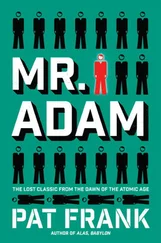Walking down the main corridor towards the taxi loading ramps at the far side of the building, Katharine Hume saw an unusual sight. A leggy Air Force lieutenant, clutching a sheet of paper in his hand like a relay racer’s baton, sprinted past her at top speed. She considered stopping in at Jess Price’s office to find out if anything important had happened. But Price, like all the others, would be busy. Her curiosity could wait. As for herself, she doubted whether she could enlist a powerful ally within the AEC, although she would try. Only the AEC commissioners would have sufficient prestige to influence the Joint Chiefs and she knew that the commissioners—even if they agreed with the group’s findings—would hesitate to interfere with what was primarily an internal affair of the Pentagon. If help came, it would have to come through the military. All the way home she wondered about the Air Force lieutenant, recalling how his hair bounced on the back of his head with each long step. She had never seen anything, even one of the three-wheel carts pedaled by messengers, move that fast in the Pentagon before. 5
Airman 2/c Smith awoke at three that afternoon, showered, put on his pressed blues, and caught a base bus to Orlando. He sauntered through the lobby of the biggest hotel, the Angebilt, bought an evening paper, and went into the bar to kill time. Betty Jo Atkins, his girl, wouldn’t get home until five-fifteen. She was a waitress at the Sea Trout Inn, and her hours nine to five.
He ordered a bourbon and water and glanced at the single black headline. FOURTH B-99 IS MISSING! The story was out of Lake Charles, Louisiana. The bomber had taken off that morning on what was described as a routine training mission over the Gulf. Circumstances were identical with the B-99 that had vanished from Hibiscus in November, and the two others that disappeared Monday. Since all available air-sea rescue planes were already occupied in searches, the Air Force had sent out tactical planes, called on the Civil Air Patrol and airlines for help, and was bringing down an additional air-sea rescue squadron from Alaska.
Smith read the story, in its entirety, with relief. At least one of his three companions was on the job. The heat would be off Hibiscus. He felt neither pity nor exaltation. He was certain the crews were dead, just as he was certain that the crews of the first three B-99’s had died, quickly. They were soldiers, as he was a soldier.
A stranger, a civilian of about his own age, edged along the bar, looked at the headline over Smith’s shoulder, and said, “What d’you think’s wrong with those bombers?”
“I wouldn’t have any idea,” Smith said. He knew that SI men were on the prowl all over the place, not only at Hibiscus, but combing the bars and theaters and dance halls in Orlando and Tampa as well. He knew that Special Investigations men customarily wore civilian clothes, so you could not tell a sergeant from a colonel. But if you had long experience with undercover agents, as Smith had, then you could smell them, of whatever rank or nationality. This man was undoubtedly SI, probably a captain, listening for loose talk.
“I think it’s sabotage,” the man said.
“Do you?” said Smith. An agent provocateur, he thought, a clumsy one. Smith finished his drink and walked out. He stopped at a drugstore, twirled a rack of quarter books, and selected one called, Lost at Sixteen, with an undraped, nubile redhead bent back across its cover. Betty Jo liked to read, providing it was about sex. Then he took a cab to her house, south of the city on Orange Blossom Trail.
She wasn’t at home yet and the door was locked so he sat on the steps and waited. The house was one of a row of four-room dwellings, identical except for the color of their roofs, its construction modern but cheap. Betty Jo’s rent was $55 a month. She complained that this was more than she could afford, except during the winter season when the Sea Trout attracted the tourists and tips were good. Northerners tipped fifteen or twenty percent, she said, Southerners rarely more than ten, and the back country crackers sometimes nothing at all. Betty Jo often pointed out that the house was plenty big enough for two. On these occasions he usually gave her a ten or twenty to help out. Money wasn’t all she wanted, or what she was really after, but money stopped her worries and whimpering, at least temporarily. Presently a green-and-white Chevvy turned off the Trail into Kingsley Street and pulled into the carport. “Hi, honey,” he said, opening the door for her. Betty Jo was home.
Betty Jo’s maiden name was Iwanowski. She was wide-hipped, deep-bosomed, and heavily boned, the heritage of Slavic grandparents who had settled in Detroit. Her face was round and pleasant, her hair long and yellow, and her skin tough and tallow-colored, so that no matter how many hours she sunned she never seemed able to acquire a tan.
The men in her family had always worked in the automobile factories, but none had ever graduated beyond the ABC’s of the assembly line. Betty Jo herself was a little backward in her studies, but precocious in other ways. At sixteen she married Atkins, a marijuana-smoking drugstore cowboy, and part-time collector for a neighborhood bookie. She lived with Atkins, off and on, for two years. Then her father loaned her enough to take a bus to Florida and get a divorce. Florida divorces were almost as quick, and much cheaper, considering transportation and living costs, than Nevada divorces. That’s what the union lawyer in Detroit had advised her father. After the divorce came through she had stayed in Orlando. She was now twenty-four and seriously concerned about her future. She hated being a waitress, but it was all she knew. She wanted to get married to a good, solid man like Stanley Smith, with a steady job in the Air Force.
Stan Smith was the most considerate man she had ever known, and the handsomest. He had lunched at the Sea Trout two or three times, Fridays or Saturdays, always finding a seat at one of her tables, before he asked for a date. She had given him a date the first time he asked, and invited him to her house that first night, and not withheld herself from him. He was so handsome that she wondered why he had fallen for her, and inquired, frankly. He said that she reminded him of the girls back home. Back home, she understood, meant Iowa. She’d accepted it as a compliment since she’d known a couple of nice girls from Iowa, both of them pretty, and slim.
Stan had done a wonderful thing for her. He’d bought her a car, a brand-new Chewy hardtop. After that, she wasn’t at the mercy of the lousy bus service and it wasn’t so hard living out on the south end of town. Oh, she understood that it was really his car and he could take it and use it whenever he wanted. But he’d put it in her name, which to Betty Jo’s mind indicated his intention to marry her, because she was sure no man would give her a car unless he expected to get it back.
He was real kind, and generous, in other ways. He only wanted one thing from her, and she needed that too, so they never had any quarrels. Nor did she date anyone else, seriously, because she never knew when Stan would turn up. It could be any evening, early, because he always worked the midnight shift at the base. Generous and dependable as he was, in some ways Stan seemed strange. He could sit for hours, looking at her, without ever really seeing her. He ate anything she put in front of him, never said it was good or bad. Sometimes he talked in his sleep, and threshed wildly about, his right arm jerking as if throwing a baseball. She never understood a word he said, when he was like that, because his language was so garbled. It sounded almost foreign. It sounded like Grandpa Iwanowski when he was drunk.
This afternoon, when she stepped out of the car into Stan’s arms, she felt a little guilty. Backing out of her parking place downtown she had rammed the car behind her, creased the left rear fender of the Chevvy, and smashed the left tail light. She hoped he wouldn’t notice. She’d get it fixed after she was paid, Saturday. Inside the house, she kissed him and led him to the bedroom. Later, she cooked steaks. When he called a cab and left at ten-thirty, in time to make the eleven o’clock bus back to the base, she was curled up in bed, reading the book he had bought her.
Читать дальше












